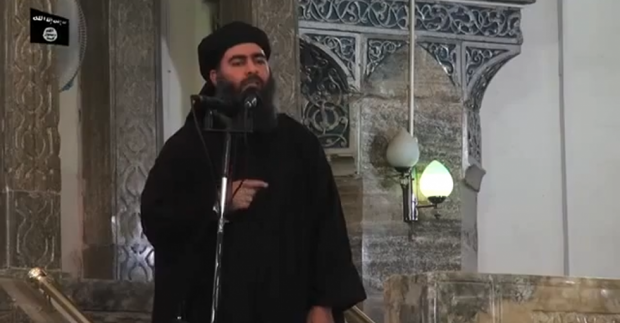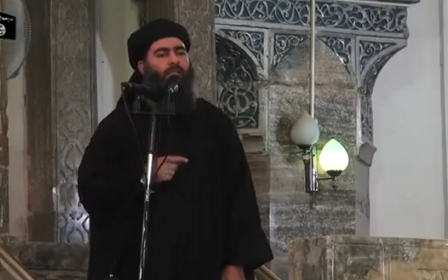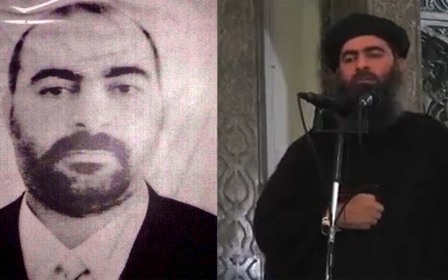History doesn't bode well for Baghdadi's Islamic State

The past week will undoubtedly see etched in the annals of history a man called Abu Bakr al-Baghdadi who claimed the office of caliph for himself; someone who attempted to establish a type of Islamic caliphate and state across the great plains of al-Sham (the Levant) and Iraq – once home to the expansive Umayyad and Abbasid caliphates.
Remarkably, the newly formed ‘Islamic State’ (IS), formerly known as ISIS or ISIL, stands as the only modern group to claim the establishment of a Caliphate, with the exception of the Ahmadiyya Muslim Community that established a non-political Caliphate in 1908 that still exists today. The Sokoto Caliphate of Nigeria came to an end at the turn of the 20th century, quickly followed by the fall of the great Ottoman Empire in 1924 after more than 600 years in power; the Caliphate movement of India, which boasted the direct support of Mahatma Gandhi, failed to gain any trajectory, as was the case with a later joint attempt in the 1970s by the then King of Saudi Arabia, King Faisal Al-Saud, and the later executed President of Pakistan, Zulfiqar Ali Bhutto, to establish the office of Caliph.
Last week, al-Baghdadi, who shares the same forename -by deed pole- as the first Caliph of Islam, Abu Bakr al-Siddiq (the Truthful), stood in ‘The Great Mosque’ of Mosul where he echoed the words spoken by the first Caliph of Islam during his inaugural public address. This was all rather ironic given the great difference in temperament and justice between the two.
"I am not better than you or more virtuous than you. If you see me on the right path, help me. If you see me on the wrong path, advise me and halt me. And obey me as far as I obey God," al-Baghdadi told worshippers during his Friday Sermon.
However, the soil he stands on is by no means foreign to the institution of caliphate. Long before IS and modern extremism came into existence, Iraq was home to the Abbasid Caliphate (750-1258) with Kufa, Baghdad and Samarra among the Islamic empire’s key cities at different times. It is here that history offers us a stark insight into some of the current issues at hand and perhaps even into a possible future trajectory of the region.
Recent reporting on the theological and legal background to caliphate has largely accepted it as a homogeneous office that always refers to a Successor to the Prophet Muhammad. However, this understanding betrays the reality of complicated Islamic governance theory. Under Islamic law, to accept that any individual can unilaterally announce himself as a legitimate caliph is as ludicrous as to suggest that someone can become the Pope by simple verbal pronouncement.
It would be equally as strange to believe that the extraordinary legitimacy and influence of the Prophet Muhammad is inherited purely on the basis of people affirming themselves as caliphs. Caliph, or Khalifa in Arabic, literally means ‘Successor’. So who, exactly, is Abu Bakr al-Baghdadi succeeding? And can he legitimately be held up as a successor to the Prophet Muhammad?
In Sunni theology, the rightful, or Rightly Guided successors (caliphs) to the Prophet Muhammad were the first four caliphs of Islam, Abu Bakr al-Siddiq, Umar b. al-Khattab, Uthman b. Affan, and Ali b. Abi Talib. Shiite Muslims believe that Ali, the fourth Caliph, was the rightful Successor to the Prophet and that spiritual legitimacy was then transferred to a series of later Imams.
The above-mentioned caliphs, who emerged after the Prophet Muhammad, ruled for roughly 30 years, after whom the office of caliph was vested in the newly established Umayyad Caliphate. While many later caliphs laid claim to being the successors to the Prophet, it is widely accepted that they followed a monarchical system of governance, quite distinct from the first four caliphs. Furthermore, their authority could not be compared, in theological terms, to that of the ‘Rightly Guided’ or orthodox Caliphs; or, as in Shiite thought, to the authority of Imam Ali. In his recent article on IS, the academic Juan Cole drew the same conclusion writing: After Ali’s assassination, the Umayyad kings ruled (661-750), and though some scholars have found that they claimed religious charisma, they were just Arab kings.
As kings and like the rulers of all major empires, the Abbasids ruled over the Arab world with mixed competency. Unlike the Arab-centric Umayyads, the Abbasids heralded a rule inclusive of various non-Arab regions, particularly Persia – roughly speaking, modern-day Iran. Up to the ninth century, Abbasid rule is widely recognised as a golden era for the growth of Islamic, even world civilisation. For example, Baghdad became the world’s central hub of learning, witnessing many of the greatest Jewish, Christian and Muslim minds congregate to devise ground-breaking scientific and intellectual discoveries. A far cry from the dark and lifeless Iraq that IS is seeking to build today.
Al-Mutawakkil (d. 861), the tenth Abbasid caliph who lived in Samarra, was faced with the dilemma that it was becoming increasingly difficult for the authority of state and church to be entrusted to a single individual – the caliph.
Despite being poles apart on almost every level, there are two distinct similarities between the 'Abbasid caliphate of al-Mutawakkil and IS today. Firstly, to help consolidate his power, al-Mutawakkil heavily oppressed the Shiite community, had many Sunni religious opponents killed and destroyed Jewish and Christian places of worship. More crucially, however, he could not establish Muslim unity. The ‘Abbasid caliphate continued to develop, but not under al-Mutawakkil who was murdered by his Turkic guards.
Apart from the obscure Pakistani extremist group, Tehreek-e-Khilafat, Abu Bakr al-Baghdadi has thankfully hit a wall of Sunni-Shiite rejection. Beyond IS’ bespoke understanding of Islamic governance theory, no jurist gives credence to the claim that al-Baghdadi is a successor to the Prophet Muhammad.
And so it is without justification that al-Baghdadi is held up as the successor to the Prophet Muhammad. It appears more accurate to assert that al-Baghdadi's office and caliphate, to borrow Hodgson‘s description, is '…only form carrying a figurehead'. The great soil of Iraq and Syria, once home to the very first caliphates of Islam, has overcome far greater obstacles than it faces today. It deserves a leadership far more profound and charismatic than Abu Bakr al-Baghdadi, IS and, for that matter, Prime Minister Nuri al-Maliki‘s government.
- Adam Walker has published works on various issues related to the history, law and social affairs of the MENA region. He is also co-editor of the first western encyclopaedia on the Prophet Muhammad.
The views expressed in this article belong to the author and do not necessarily reflect the editorial policy of Middle East Eye.
Photo credit: An image grab from unverified IS video featuring leader Abu Bakr al-Baghdadi (YouTube)
New MEE newsletter: Jerusalem Dispatch
Sign up to get the latest insights and analysis on Israel-Palestine, alongside Turkey Unpacked and other MEE newsletters
Middle East Eye delivers independent and unrivalled coverage and analysis of the Middle East, North Africa and beyond. To learn more about republishing this content and the associated fees, please fill out this form. More about MEE can be found here.





